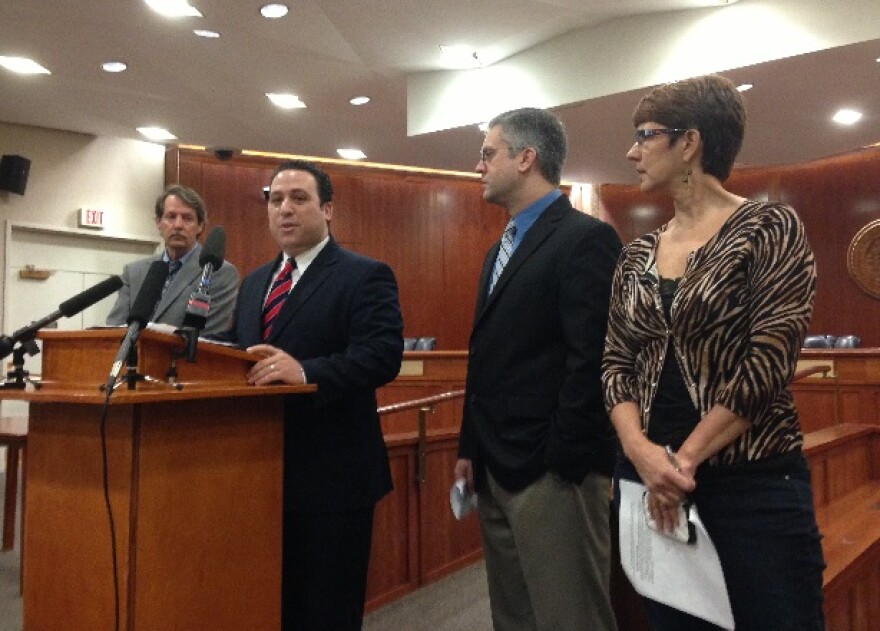In the wake of Lt. Gov. Jennifer Carroll’s resignation amidst a racketeering probe, a bipartisan coalition is calling for stronger ethics reform in Florida. The group warns, the bill the Senate passed on day one of session takes steps backward instead of forward. And a bill a House panel will consider on Tuesday does not go far enough, they say.
A Tea Party conservative, a progressive, a government watchdog, and a veteran ethics commissioner are sharing a lectern in the Florida Cabinet Meeting Room. No, it’s not the start of a joke. They’re all very serious about one common goal:
Catherine Baer, with the Florida Tea Party Network, said, “Ethics reform is not a partisan issue, as evidenced by the diverse group of organizations that are represented here today. The Tea Party Network believes that the decline in America is a direct result of the people disengaging from the process. The Legislature can invite them back to the table by enacting meaningful ethics legislation. This legislation that is presented from the Senate and the House doesn’t go far enough.”
The coalition is calling for much stricter reform than what’s in the bill the Senate unanimously passed and in the one going before a House committee.
Dan Krassner, who heads the government watchdog group Integrity Florida, says, the last time comprehensive ethics reform was passed in Florida was in the mid-1970s. Then-Lt. Gov. Tom Adams had just been dropped from Gov. Reubin Askew’s reelection ticket, after it was found Adams was using a government worker to tend to his private property.
“Flash forward now, more than 36 years later, we have the same kind of dysfunction in Washington, and Florida’s lieutenant governor just stepped down,” he said. “This is a tremendous opportunity for the people of Florida to see a responsive governor and a responsive legislature pass meaningful, comprehensive ethics reform.”
Krassner said, above all, the group is calling for the state Ethics Commission to be allowed to start its own investigations, not just respond when someone files an ethics complaint. He said, in the case of former Lt. Gov. Carroll, such investigative powers could have raised questions while she was still a state representative.
“If we had an Ethics Commission that had the power and authority that 30 other states have, questions would have been asked about the former lieutenant governor’s financial disclosures more than 10 years ago,” he said.
Krassner said, Carroll’s financial disclosure forms showed questionable things like an increase in net worth of more than $20 million in a single year, between 2003 and 2004.
And Phil Claypool, a former Ethics Commission executive director who started with the commission in 1976, said, more investigative power is what the people want.
“When I was with the commission, I did not hear from the public that we were being too aggressive against public officials,” he said. “What I regularly heard from the public and the press was that we were ‘toothless tigers,’ we were ineffectual and that we didn’t have enough powers.”
Claypool said, he’s seen former Govs. Bush and Crist call for ethics reform with no success, so his expectation bar has been set pretty low. But, he said, he couldn’t sit this one out without a good fight. So he wrote a memo to Integrity Florida, outlining all the problem areas of the two ethics bills making their way toward a floor vote.
One problem, he said, is that right now, the Ethics Commission can’t investigate an ethics complaint against a candidate if it’s filed within five days of an election. But the Senate bill makes it worse, not better.
“The bill would extend that five-day period to 30 days. I don’t know how that’s helping the people of Florida. But it sure seems to be helping public officials and protecting them from the Ethics Commission,” he said.
Another big problem with the bill, he said, is candidates would have a longer period of time to amend their financial disclosure forms. So they can potentially win a primary election before giving the public accurate information about their finances.
Damien Filer, who heads the progressive advocacy group Progress Florida, said, ethics reform is a top priority for his supporters.
“Ethics impacts every other issue that gets voted on here, from education to health policy to environmental policy, tax policy and everything else. So, this is a critical issue,” he said.
The group said, the bills aren’t all bad, though. For example, they applaud the new power the commission would have to collect late-disclosure fines from elected officials by docking their pay.
But Krassner said, there’s one person whose voice is missing from the debate.
“Ethics reform was not mentioned in the State of the State. We need Governor Scott’s leadership on ethics reform,” he said.
Krassner is hoping lawmakers take Claypool’s suggestions into account before passing any final package. The House is hearing its version of ethics reform on Tuesday afternoon.


